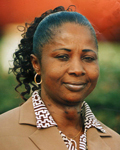2009, 2012
Chinwe Roseann Ezeifeka
- Lecturer
- Nnamdi Azikiwe University

Abstract
Language has been implicated as a means of creating asymmetrical power relations among individuals and groups within social institutions. These dominant discourses have the characteristics of making ideological positions appear natural and opaque such that some groups are under-represented. Sometimes, even the dominated are unaware because these ideological positions have become part of the knowledge base, hence an unquestionable “order of discourse.” An attempt is made here to study this repressive language use within three social institutions in Nigeria, namely, the print media, with particular reference to the May to June 2008 editions of the Guardian Newspapers that reported the nation-wide industrial action by primary and secondary school teachers; political discourse using two political speeches by two past Nigerian leaders; and gender discourse using data from the above two sources. Five research questions are answered through textual analysis of the selected editions and speeches. Systemic functional grammar and content analysis, using insights provided by a research paradigm called Critical Discourse Analysis, are employed. Finally, a panel survey samples the awareness of those affected by these dominant discourses to be analyzed using simple percentages.
Abstract
Language, in transmitting culture, experiences, and worldviews, can be instrumental to the production of social stereotypes and stigmatized expressions where the linguistic representations of some individuals or groups are cast in apparently irreversible social molds. This work documents the various forms of gender stereotypes evident in selected Igbo folk expressions such as proverbs, metaphors, names, songs, and taboo expressions, and argues that these expressions perpetuate asymmetrical representations and biased ideological positions that are counter-productive to sustainable development. The inequities ingrained in and legitimized by these expressions are critically examined through the perspectives of critical discourse analysis (CDA), a qualitative research paradigm that scrutinizes texts and discursive practices to reveal underlying repressions and dominance. The work therefore aims at creating awareness of the social injustices and retrogressive potentials of these stereotypes, which have hitherto been taken for granted as 'given' and as 'orders of discourse' for reappraissal and possibe redress.

